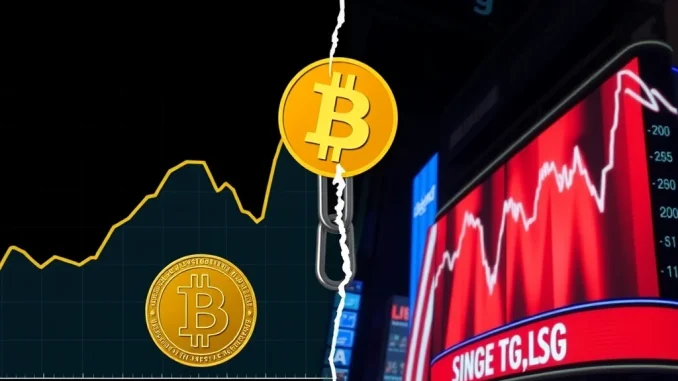
For years, the cryptocurrency market, particularly Bitcoin, has danced to the tune of traditional financial markets, often mirroring the movements of U.S. stocks. But is this synchronized choreography finally coming to an end? Recent reports suggest a fascinating shift: Bitcoin correlation with U.S. stocks might be showing signs of weakening. Let’s dive into what this potential Bitcoin decoupling means for the future of crypto and what smart investors should be watching.
Is the Tight Grip Between Bitcoin and US Stocks Loosening?
The narrative of Bitcoin as a risk-on asset, heavily influenced by macroeconomic factors and the performance of traditional markets like the Nasdaq 100, has been dominant for quite some time. However, recent data points towards a possible divergence. CoinDesk highlighted an intriguing instance on April 16th:
- While the tech-heavy Nasdaq 100 experienced a significant drop of up to 4.5%, BlackRock’s spot Bitcoin ETF (IBIT) swam against the tide, actually gaining 0.46%.
- Even during U.S. Federal Reserve Chair Jerome Powell’s speech, which typically sends ripples across both stock and crypto markets, we observed a similar pattern. Both initially reacted negatively, but Bitcoin demonstrated resilience, quickly rebounding to $84,000. In contrast, the Nasdaq 100 continued its downward trajectory before staging a recovery later in the session.
This isn’t just a one-off event. It sparks a crucial question: Are we witnessing the beginning of a true Bitcoin decoupling from traditional market influences?
Why is Bitcoin Decoupling from US Stocks a Big Deal?
The potential Bitcoin decoupling carries significant implications for the cryptocurrency ecosystem and investors. Here’s why it’s a noteworthy development:
- Diversification Benefits Re-emerge: For a long time, the high Bitcoin correlation with assets like US stocks limited its effectiveness as a diversification tool. If Bitcoin starts to move independently, it could regain its appeal as a hedge against traditional market volatility.
- Maturing Market Narrative: Decoupling could signify a maturing crypto market, one that is increasingly driven by its own fundamentals, adoption rates, technological advancements, and specific crypto-centric narratives, rather than solely reacting to macroeconomic winds or tech stock performance.
- New Investment Strategies: A less correlated Bitcoin opens up new avenues for portfolio construction and risk management strategies. Investors might be able to leverage Bitcoin’s unique characteristics without being overly concerned about the broader stock market sentiment.
- Reduced Systemic Risk?: If Bitcoin and crypto become less intertwined with traditional finance, it could potentially reduce systemic risk, making the crypto market less vulnerable to shocks originating from the traditional financial system.
Factors Potentially Driving the Bitcoin Decoupling
Several factors could be contributing to this shift in Bitcoin correlation:
- ETF Influence: The rise of spot Bitcoin ETFs like IBIT could be altering market dynamics. These ETFs provide easier access to Bitcoin for institutional and retail investors, potentially attracting a different type of capital that is less aligned with traditional stock market trading patterns.
- Bitcoin’s Store of Value Narrative: As Bitcoin matures, its narrative as a store of value, digital gold, and inflation hedge might be gaining stronger traction. This could lead investors to view Bitcoin as a separate asset class with its own intrinsic value proposition, distinct from tech stocks.
- Global Macroeconomic Divergence: While U.S. markets are influenced by the Federal Reserve’s policies and domestic economic conditions, Bitcoin operates on a global stage. Divergences in economic policies and conditions across different regions might lead to Bitcoin reacting to a broader set of global factors rather than just U.S. stock market sentiment.
- Technological Advancements and Adoption: Growth in the underlying blockchain technology, increasing adoption of cryptocurrencies for various use cases (beyond just investment), and developments within the crypto ecosystem itself (like DeFi, NFTs, etc.) could be creating a stronger internal momentum for Bitcoin, independent of traditional markets.
Is This a Temporary Blip or a New Trend for Bitcoin?
While the signs of Bitcoin decoupling are intriguing, it’s crucial to maintain a balanced perspective. It’s still early to definitively declare a complete and permanent separation. Market correlations can be fluid and change over time. Here are a few points to consider:
- Correlation is Dynamic: Historical data shows that Bitcoin correlation with traditional assets has fluctuated. Periods of high correlation can be followed by periods of low correlation, and vice versa.
- Macroeconomic Events Still Matter: Major macroeconomic events, unexpected economic data releases, or significant shifts in monetary policy can still impact all markets, including Bitcoin.
- Need for Sustained Observation: To confirm a true decoupling, we need to observe this trend over a longer period and across various market conditions. One day or even one week of divergence isn’t enough to draw definitive conclusions.
Actionable Insights for Crypto Investors
Regardless of whether this decoupling is temporary or long-lasting, here are some actionable insights for crypto investors:
- Monitor Correlation Trends: Keep an eye on the evolving Bitcoin correlation with US stocks and other asset classes. Tools and platforms are available that track these correlations over time.
- Diversify Within Crypto: While Bitcoin decoupling from traditional markets is a positive sign for diversification, remember to also diversify within your crypto portfolio. Explore different types of cryptocurrencies and blockchain projects.
- Stay Informed on Crypto Fundamentals: Focus on the fundamental developments within the crypto space – technological advancements, adoption metrics, regulatory landscape, and project-specific news. These factors are likely to become increasingly important drivers of crypto asset performance if decoupling strengthens.
- Manage Risk Wisely: Even with decoupling, the crypto market remains volatile. Employ prudent risk management strategies, including position sizing, stop-loss orders, and only investing what you can afford to lose.
Conclusion: A Glimmer of Independence for Bitcoin?
The signs of weakening Bitcoin correlation with US stocks offer a fascinating glimpse into a potential future where crypto assets operate with greater independence. While it’s crucial to avoid premature declarations, the recent market behavior suggests that Bitcoin might be carving out its own path, driven by its unique characteristics and evolving market dynamics. For investors, this potential Bitcoin decoupling presents both opportunities and challenges, demanding a more nuanced and informed approach to navigating the exciting world of cryptocurrency investments. Keep watching this space – the story of Bitcoin’s evolving relationship with traditional markets is far from over, and the next chapters promise to be captivating.



